Greta Thunberg, the climate campaigner who doesn't like campaigning
- Published
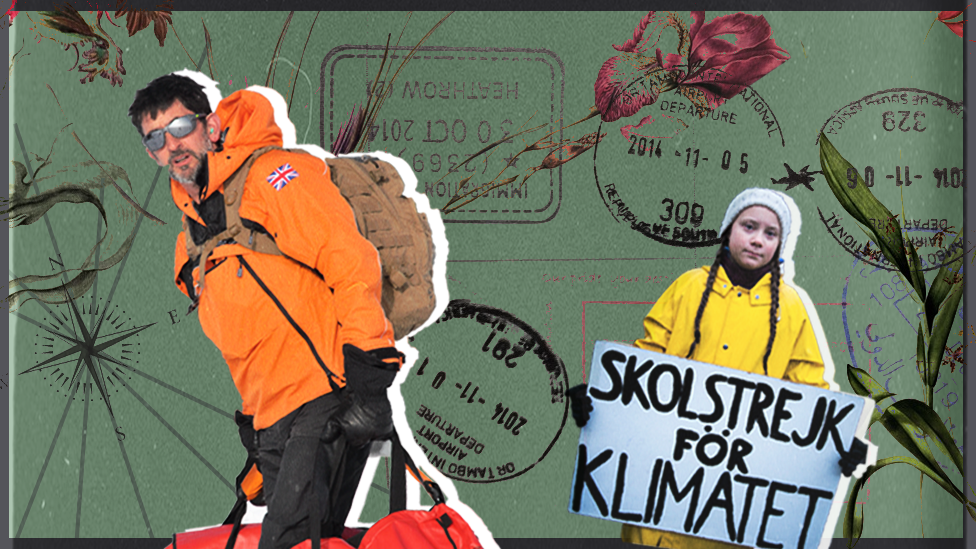
It sounds like a year off made in heaven.
How about you take Arnold Schwarzenegger's electric car on a road trip around America?
Maybe stop off along the way to tell the world's most powerful people how they can put the world to rights.
You might want to address hundreds of thousands of adoring admirers at a few giant rallies.
And don't forget to schedule in some epic scenery.
Oh, and while you are about it, why not sail across the Atlantic on one of the fastest racing yachts ever made?
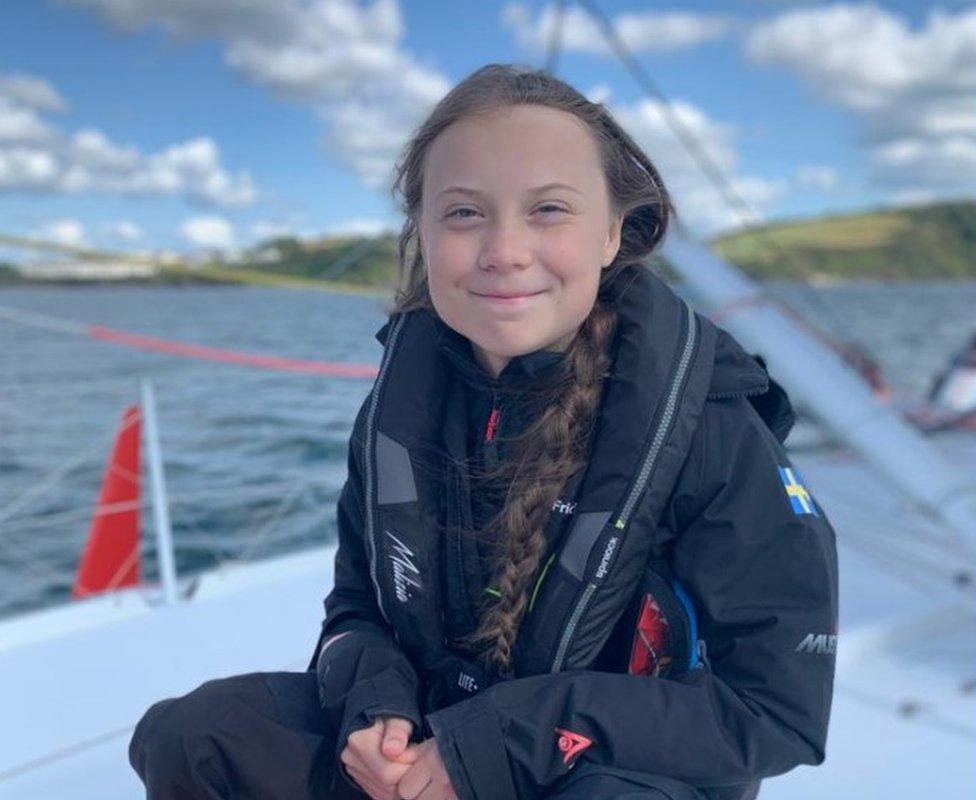
That is what Greta Thunberg has spent last year doing, but the teenage climate campaigner doesn't seem to have enjoyed it much.
I don't think she is being a brat. I believe Greta knows how unique and special her life has been and how privileged she is.
The world's most famous climate campaigner just doesn't actually like campaigning very much.
"I am in this because I want to be," she tells me. "And that's not because I think it's fun. That's not because I enjoy the attention. It's because I want to make a difference."
Think about her demeanour. She's not your usual public figure.
She usually looks a bit tense and uncomfortable and rarely seems to be enjoying herself.
Donald Trump was on to something when he teased her in a tweet saying, "She seems like a very happy young girl looking forward to a bright and wonderful future."
And ironically the fact she doesn't like all the attention makes her an even more curious and captivating figure for us all.
I've now had two long conversations with the activist.
We met in person on the deck of Malizia, the yacht that whisked her across the Atlantic. That was in September last year.
Then a couple of weeks ago I had a virtual encounter with Greta for a television interview. She was in her flat in Stockholm, I was in a greenhouse in Kew Gardens.
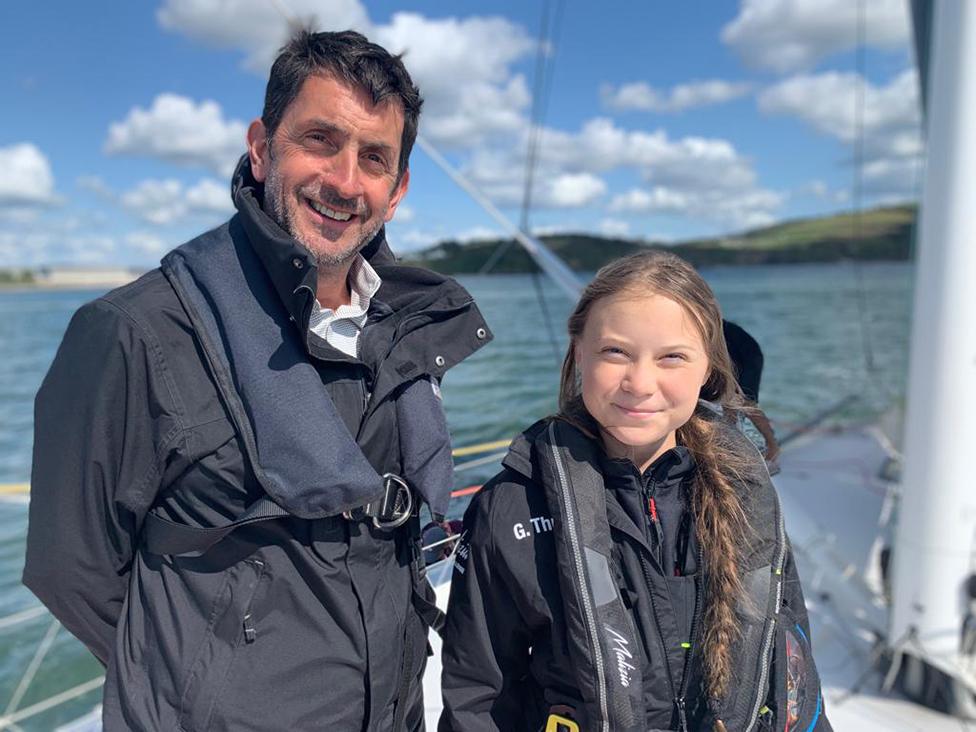

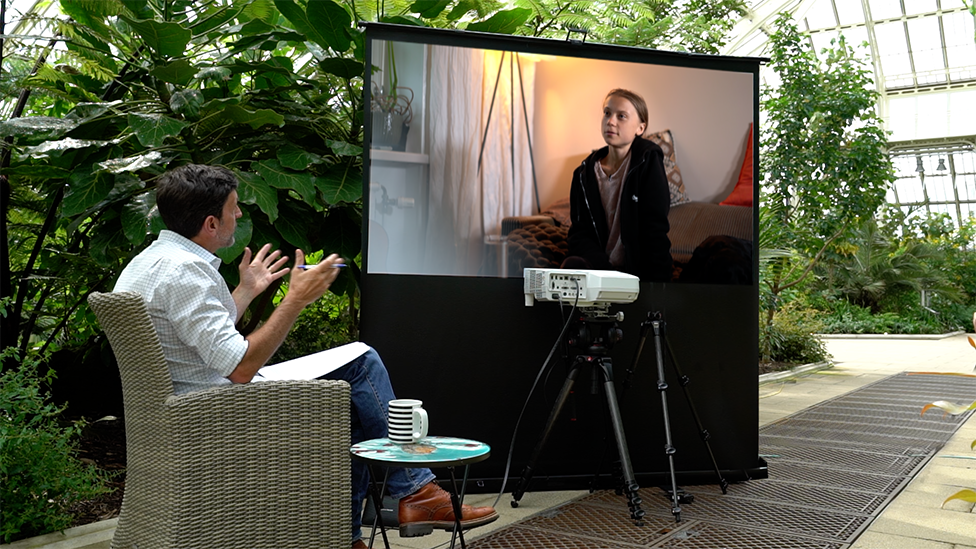
I asked her about that speech. You know, the "How dare you!" one.
I'm sure you remember it. It was a coruscating attack on world leaders that echoed across the world in endless social media posts and newspaper headlines.
"You have stolen my dreams and my childhood with your empty words," says Greta, her voice shaking with emotion, apparently on the verge of tears.
"And all you can talk about is money and fairy tales of eternal economic growth. How dare you!"
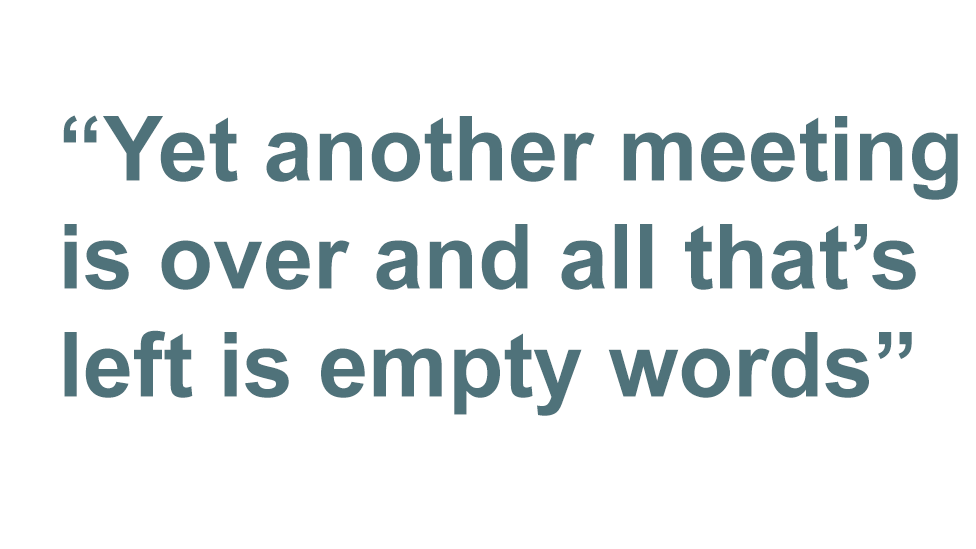
She describes taking the subway home from the UN that evening. She says she could see people watching the speech on their phones.
"Some come forward to congratulate me, someone suggests we should celebrate," she recalls.
"But I don't understand what their congratulations are for, and I understand even less what we're supposed to be celebrating," says Greta.
"Yet another meeting is over. And all that is left is empty words."
"You are failing us" - Greta tells world leaders
If it is all so thankless, why on earth does she bother?
The answer to that question is, of course, bound up in her own psychology.
Greta says she feels compelled to act on climate.
"Many people seem to be able to see the climate crisis and say like, 'Yeah, it's really important,' and then just go on with their everyday lives. I cannot do that."
She believes this compulsion is a result of her autism, which she describes as her "superpower".
"I'm very stubborn," she tells me. "If I'm committed to something I go all in."
The fact that she doesn't see her activism as an act of volition, "a choice", is crucial to understanding her.
"I don't like this attention," she says. "If I were to choose I would just be like everyone else and continue studying because that's what I enjoy doing the most."
"But since this is such an extraordinary situation, we have to do things that we might not always find very comfortable."

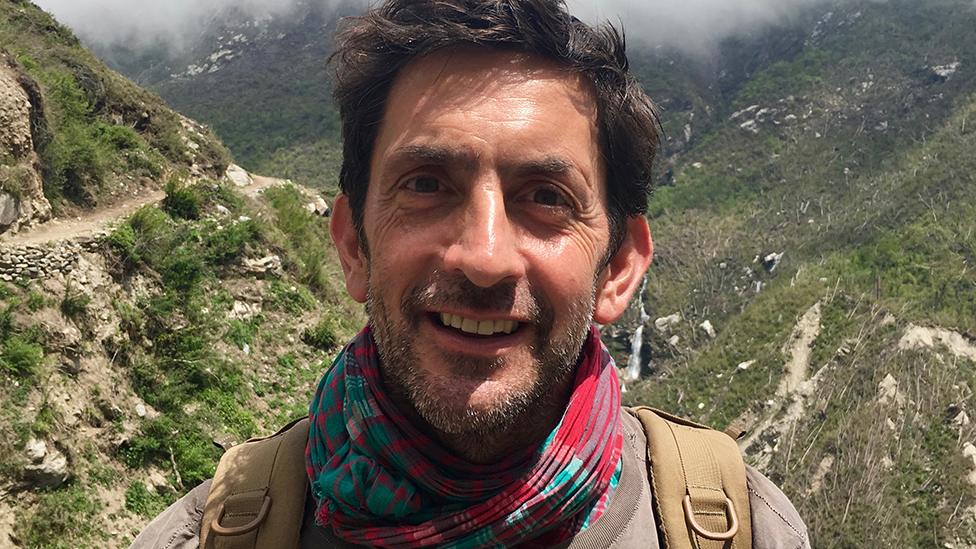
I've travelled all over the world for the BBC and seen evidence of climate change everywhere. It's the biggest challenge humanity has ever faced. Tackling it means changing how we do virtually everything. We are right to be anxious and afraid at the prospect, but I reckon we should also see this as a thrilling story of exploration, and I'm delighted to have been given the chance of a ringside seat as chief environment correspondent.

The iconic image of Greta Thunberg is that picture of a schoolgirl with pigtails protesting alone outside the Swedish parliament, her "Skolstrejk for Klimatet" poster by her side.
Once again, she doesn't feel the lonely vigil was something she actively chose.
She tells me she tried working with other people, joining existing organisations, but it didn't go well.
"I was too bad at socialising, I just hated making small talk and constantly being around so many people."
She decided to do something by herself, and came up with the school strike idea - unwittingly creating what has become a global brand.
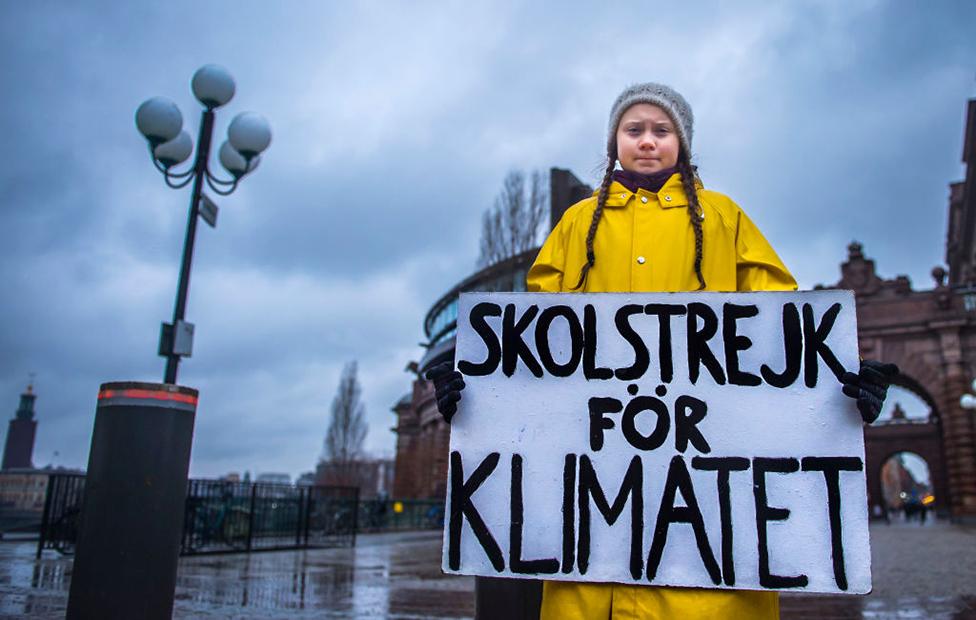
She articulates her message very clearly, there is no doubt about that.
But what makes Greta unique is the paradox of the vulnerable-looking young girl speaking her version of truth to the most powerful people on earth.
It explains why she has been such a potent advocate for the climate cause.
And she is certainly that. Greta Thunberg has done more to galvanise action on the issue than any other single individual in the last year.
But she constantly laments the lack of global progress on climate and tells me she is stunned by how little world leaders understand about the issue.
Their level of knowledge is, she says, "very, very low. Much lower than you would think."
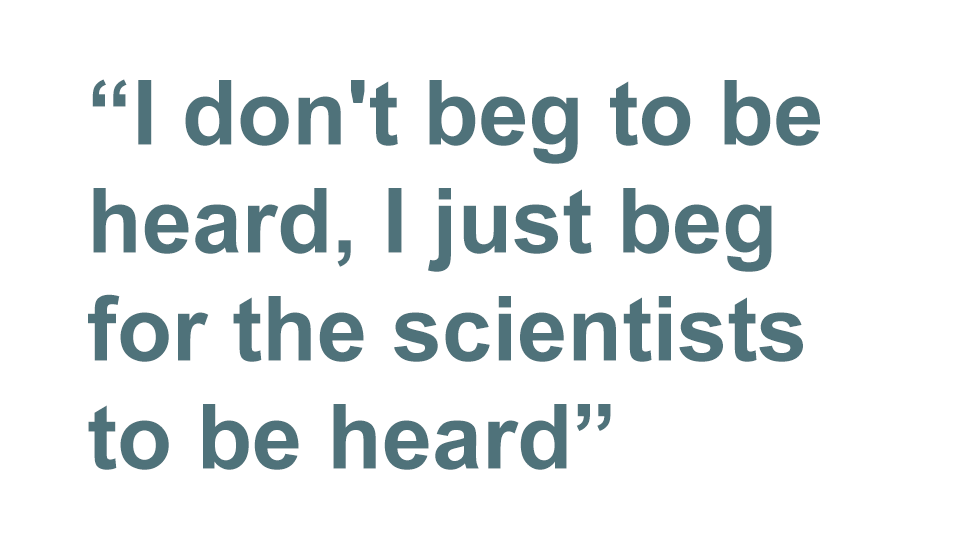
When we first spoke, I asked whether she is ever afraid that she will end up like Cassandra, the figure from Greek mythology.
Cassandra was cursed to be able to see into the future but for everyone to disbelieve her prophecies.
Greta Thunberg said she had no such fears.
"Many people listen to me", she said.
"I don't beg to be heard. I just beg for the scientists to be heard."
She believes the message that individual action can make a difference is getting through.
She talks about a "social tipping point" having been passed, not just on climate but on race, gender and other social justice issues.
"People are starting to realise that we cannot keep looking away from these things," she says. "We cannot keep sweeping these things under the carpet."
And Greta does get some pleasure from her efforts to get the world to take climate change seriously.
She told me that campaigning lifted her out of a period of deep depression during her early teens.
"It makes me feel good that I'm not alone in this fight," she told me as we bobbed on the deck of the racing yacht that was about to whisk her across the Atlantic.
"It feels like my life has some kind of meaning lately and I feel that what I am doing is meaningful."
She is also delighted that so many autistic people have felt empowered by her decision to speak publicly about living with the condition.

Greta's incredible year off - she calls it a sabbatical - will be over in just a couple of weeks' time.
The 17-year-old is looking forward to going back to school, she has three years of studies left.
And you won't be surprised to hear she says she won't stop campaigning any time soon.
Illustration by Jessica Sherwood
